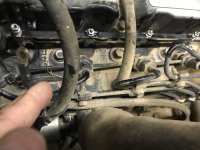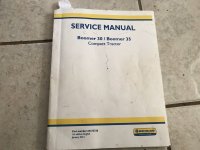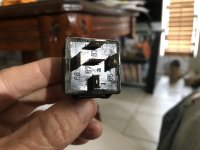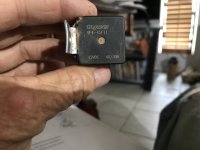LBJ23
New member
I’ve owned it since 2015 and only has 370 hours on it. About two years ago, I had a problem with the 50 amp main fuses blowing. Turned out cleaning all the grounds and terminals at all locations solved that problem by simply checking everything with a multimeter and ensuring about 12 volts are getting through, not just at the battery terminals. It must have took me 4 months to figure out all of that mess, even with 3 auto mechanics ( one certified) and two tractor mechanics not finding the problem either.
Problem of blowing 50 amp fuses is back again, but it’s not any clean terminals and grounds this time, I don’t think. I’ve went through and getting proper voltage.
I’m using the service manual which has been my most valuable source. I took another’s advice and unplugged most of elec connectors, kept turning on ignition switch until I found the one wire causing my 50 amp fuse to blow, which the pic shows. Everything else is hooked up. It goes to my glow plug bar. So I disconnect it, (see pic) and it won’t blow fuse anymore, all gauges perform as they should, glow plug light comes on, I can hear elec fuel pump working. Disconnected, I’m even able to turn over engine, although it doesn’t want to fire up, even on a warm day. I think others say they can get theirs to start and run.
Using my service manual, I’ve tested the following: ignition switch, glow plug relay, starter relay, all four glow plugs. My manual says .55 ohms maximum on glow plugs, one came in at .4, another one at .6, another at .7, and one at 1.6 which I thought may have been the main culprit, but after replacing all four, problem is still there. New ones test at .6 or .7 ohms, so they are over max ohms range too, but not by much. Last two times I’ve tried to start, it hasn’t blown out my main fuse, but after about a second after turning ignition on everything clicks off on dash.
While wire going to glow plug bar is unplugged, I’ve hooked up my multimeter to the end of it too, and shows about 12 volts for about 8 seconds like it should, before dropping to .003, which seems like what it should be doing.
I keep this tractor indoors when not in use, doubt any mice have gotten in the wiring. I’ve tried tracing down wires and wiggling them to see if something may be shorting out, no luck on finding anything there so far. Problem is not intermittent but ongoing.
I suspect some switch is still bad, but what else is left to check? Could the ignition switch still be the problem even after passing the service manual tests?
There is one relay switch my service manual doesn’t seem to identify correctly. It shows that with HST transmission glow plug relay will be on right side of tractor by flashers. On my gear model it shows it to be on left side, and as I’ve stated, it tests fine and is located there. My tractor is showing what manual says is glow plug relay on right side for HST transmissions. It has 5 prongs, and is wired into my tractor too. I’ve yet to find in service manual how to test it, maybe it’s in there, so will keep looking, and surely it doesn’t need two glow plug relays, but would like to know what it is.
Any guidance or suggestions will be appreciated. I’d love to send this to a troubleshooter guru, but they are hard to find, and I prefer not dealing with dealerships, nearest NH dealer is 80 miles away, anyhow.
Thanks in advance for any help, and if I get problem resolved, I’ll let the forum know what it was. Hopefully, it’ll help others from going through a similar ordeal on their tractors.
Problem of blowing 50 amp fuses is back again, but it’s not any clean terminals and grounds this time, I don’t think. I’ve went through and getting proper voltage.
I’m using the service manual which has been my most valuable source. I took another’s advice and unplugged most of elec connectors, kept turning on ignition switch until I found the one wire causing my 50 amp fuse to blow, which the pic shows. Everything else is hooked up. It goes to my glow plug bar. So I disconnect it, (see pic) and it won’t blow fuse anymore, all gauges perform as they should, glow plug light comes on, I can hear elec fuel pump working. Disconnected, I’m even able to turn over engine, although it doesn’t want to fire up, even on a warm day. I think others say they can get theirs to start and run.
Using my service manual, I’ve tested the following: ignition switch, glow plug relay, starter relay, all four glow plugs. My manual says .55 ohms maximum on glow plugs, one came in at .4, another one at .6, another at .7, and one at 1.6 which I thought may have been the main culprit, but after replacing all four, problem is still there. New ones test at .6 or .7 ohms, so they are over max ohms range too, but not by much. Last two times I’ve tried to start, it hasn’t blown out my main fuse, but after about a second after turning ignition on everything clicks off on dash.
While wire going to glow plug bar is unplugged, I’ve hooked up my multimeter to the end of it too, and shows about 12 volts for about 8 seconds like it should, before dropping to .003, which seems like what it should be doing.
I keep this tractor indoors when not in use, doubt any mice have gotten in the wiring. I’ve tried tracing down wires and wiggling them to see if something may be shorting out, no luck on finding anything there so far. Problem is not intermittent but ongoing.
I suspect some switch is still bad, but what else is left to check? Could the ignition switch still be the problem even after passing the service manual tests?
There is one relay switch my service manual doesn’t seem to identify correctly. It shows that with HST transmission glow plug relay will be on right side of tractor by flashers. On my gear model it shows it to be on left side, and as I’ve stated, it tests fine and is located there. My tractor is showing what manual says is glow plug relay on right side for HST transmissions. It has 5 prongs, and is wired into my tractor too. I’ve yet to find in service manual how to test it, maybe it’s in there, so will keep looking, and surely it doesn’t need two glow plug relays, but would like to know what it is.
Any guidance or suggestions will be appreciated. I’d love to send this to a troubleshooter guru, but they are hard to find, and I prefer not dealing with dealerships, nearest NH dealer is 80 miles away, anyhow.
Thanks in advance for any help, and if I get problem resolved, I’ll let the forum know what it was. Hopefully, it’ll help others from going through a similar ordeal on their tractors.




